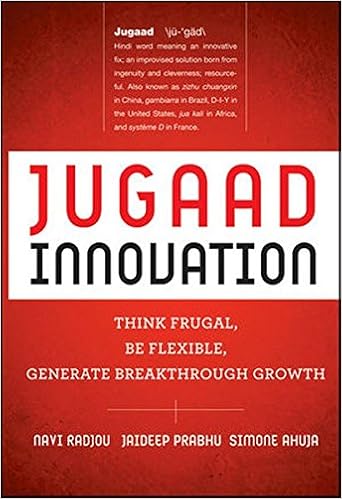
Jugaad: Innovation Think Frugal, Be Flexible, Generate Breakthrough Growth
Authors: Navi Radjou, Jaideep Prabhu and Simone AhujaNoida 2014
ISBN: 9788184002058
Navi Radjou is
an independent innovation and leadership consultant and speaker based in Palo
Alto, California. He is also a fellow at Judge Business School, University of
Cambridge. Jaideep Prabhu is the Jawaharlal Nehru professor of Indian business
and enterprise and director of the Centre for India & Global Business at
Judge Business School, University of Cambridge. Simone Ahuja is the founder of
Blood Orange, a marketing and strategy consultancy with content production
capabilities headquartered in Minneapolis and Mumbai.
This book is a
collection of striking Jugaad scheme of people all around the world. It
describes how people have built enormous companies by simple innovations.
Jugaad Entrepreneurs have converted their problems into opportunities. Book is
a simple reading and collection of many stories right from International Brands
like: 3M, Facebook, Apple to home grown companies like: Big Bazaar, Yes Bank,
SBI and many more.
Six key principles
of Jugaad
Seek opportunity
in adversity: Jugaad entrepreneurs perceive harsh constraints as an invitation
to innovate. Modern times we need to transform adversity into an opportunity to
bring value to themselves and their communities. For instance, Kanak Das, who
lives in a remote village in northeast India, grew tired of riding his bicycle
on roads full of potholes and bumps. Rather than complain, he turned this
constraint to his advantage by retrofitting his bicycle with a makeshift device
that converts the shocks it receives into acceleration energy allowing his
bicycle to run faster on bumpy roads.
Do more with
less: Jugaad innovators are highly practical in the time of scarcity. The
practitioners of Jugaad work with what they’ve got. Doing more with less is in
striking contrast to the ‘‘bigger is better.’’ In Chapter Three we find two
jugaad entrepreneurs, Gustavo Grobocopatel of Los Grobo (Argentina) and Sunil Mittal
of Bharti Airtel (India). They have developed frugal business models to
cost-effectively deliver agricultural and telecom services, respectively, to
the masses.
Think and act
flexibly: Jugaad entrepreneurs’ flexible mindset constantly questions the
status quo, keeps all options open, and transforms existing products, services,
and business models. Unconstrained by structured processes, Jugaad innovators can
quickly respond to unexpected changes in their environment. Jugaad innovators
don’t just think outside the box: they create whole new boxes. In chapter four
we find Ratan Tata, chairman of the Tata Group, who foresaw a big market for
extremely affordable cars and went on to successfully launch the $2,000 Nano in
2009.
Keep it simple:
Jugaad isn’t about seeking sophistication or flawlessness by over engineering
products, but rather about developing a ‘‘good enough’’ solution that gets the
job done. For instance, the open-source software company Ushahidi has developed
an elegantly simple solution—the Ushahidi Platform—that relies on mobile SMS
(text messaging) to coordinate bottom-up responses to cataclysmic events such
as hurricanes, earthquakes, or epidemic outbreaks. The Ushahidi Platform was
pioneered in Africa and is now being widely deployed worldwide—including in the
US—as a simple yet highly effective crisis management tool. In Chapter Five you
will discover how large Western companies such as GM, Philips, and Siemens, as
well as a next-generation companies such as Google and Facebook, are using
simplicity to ensure that their solutions are accessible and easy-to-use by a
large number of users.
Include the
margin: Western firms typically struggle
to serve mainstream customers; in contrast, Jugaad entrepreneurs intentionally
seek growth Strategy for marginal, underserved customers and pull them into the
mainstream. Such entrepreneurs conjure up radically affordable solutions to
meet the needs of these underserved markets. Their inclusive business models
engage low-income and nontraditional communities. For instance, Dr. Liu Jiren,
Chairman and CEO of Neusoft, China’s largest IT solution and service provider,
is concerned about the health of eight hundred million Chinese living in rural
areas. Dr. Liu’s genuine concern for China’s marginal segments led him to
develop inclusive technology solutions, such as telemedicine applications that
deliver affordable health care to millions of rural Chinese. Marginal segments
that increasingly include middle-class consumers in the United States are
purchasing power is being squeezed by the lack of growth in their income over
the last decade.
Follow your
heart: Jugaadoos do not rely on focus groups or formal market research to
decide what products to make nor do they worry how investors will react to
their new product strategies. They know their customers and their products
intimately and ultimately, they trust and follow their hearts. Specifically, Jugaad
entrepreneurs employ intuition, empathy, and passion and other qualities that
are increasingly just as important as analytical thinking in navigating a
global environment that is ever more diverse, interconnected, and unpredictable.
For instance, Kishore Biyani, who is the founder of Big Bazaar, one of India’s
largest and most successful retailers, he did not use management consultants to
validate his idea of launching retail stores that look, feel, and even smell
like chaotic street bazaars.
In this book, authors
argue that Jugaad is an important tool that Western companies can add to their
existing innovation toolkit. We explore each of the underlying principles of Jugaad
and show how they can fortify a structured approach to innovation and achieve
growth by adding frugality and agility.
In short, authors
provide a wealth of examples of entrepreneurs who have found success by doing
more with less’ "Jugaad Innovation”. Jugaad Innovation argues that the
West must look to places like India, China, and Africa for a new, bottom–up
approach to frugal and flexible innovation.
I recommend this read to all
business people, who are interested in frugal innovation.










0 comments:
Post a Comment